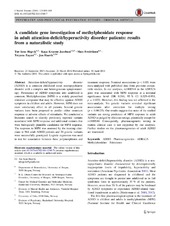| dc.contributor.author | Hegvik, Tor-Arne | en_US |
| dc.contributor.author | Jacobsen, Kaya Kvarme | en_US |
| dc.contributor.author | Fredriksen, Mats | en_US |
| dc.contributor.author | Zayats, Tetyana | en_US |
| dc.contributor.author | Haavik, Jan | en_US |
| dc.date.accessioned | 2017-01-12T12:16:52Z | |
| dc.date.available | 2017-01-12T12:16:52Z | |
| dc.date.issued | 2016-08 | |
| dc.Published | Journal of neural transmission 2016, 123:859-865 | eng |
| dc.identifier.issn | 0300-9564 | |
| dc.identifier.uri | https://hdl.handle.net/1956/15354 | |
| dc.description.abstract | Attention-deficit/hyperactivity disorder (ADHD) is a common childhood onset neuropsychiatric disorder with a complex and heterogeneous symptomatology. Persistence of ADHD symptoms into adulthood is common. Methylphenidate (MPH) is a widely prescribed stimulant compound that may be effective against ADHD symptoms in children and adults. However, MPH does not exert satisfactory effect in all patients. Several genetic variants have been proposed to predict either treatment response or adverse effects of stimulants. We conducted a literature search to identify previously reported variants associated with MPH response and additional variants that were biologically plausible candidates for MPH response. The response to MPH was assessed by the treating clinicians in 564 adult ADHD patients and 20 genetic variants were successfully genotyped. Logistic regression was used to test for association between these polymorphisms and treatment response. Nominal associations (p < 0.05) were meta-analysed with published data from previous comparable studies. In our analyses, rs1800544 in the ADRA2A gene was associated with MPH response at a nominal significance level (OR 0.560, 95 % CI 0.329–0.953, p = 0.033). However, this finding was not affirmed in the meta-analysis. No genetic variants revealed significant associations after correction for multiple testing (p < 0.00125). Our results suggest that none of the studied variants are strong predictors of MPH response in adult ADHD as judged by clinician ratings, potentially except for rs1800544. Consequently, pharmacogenetic testing in routine clinical care is not supported by our analyses. Further studies on the pharmacogenetics of adult ADHD are warranted. | en_US |
| dc.language.iso | eng | eng |
| dc.publisher | Springer | eng |
| dc.rights | Attribution CC BY | eng |
| dc.rights.uri | http://creativecommons.org/licenses/by/4.0 | eng |
| dc.subject | ADHD | eng |
| dc.subject | Pharmacogenetics | eng |
| dc.subject | ADRA2A | eng |
| dc.subject | Methylphenidate | eng |
| dc.subject | Stimulants | eng |
| dc.title | A candidate gene investigation of methylphenidate response in adult attention-deficit/hyperactivity disorder patients: results from a naturalistic study | en_US |
| dc.type | Peer reviewed | |
| dc.type | Journal article | |
| dc.date.updated | 2016-12-15T09:15:41Z | |
| dc.description.version | publishedVersion | en_US |
| dc.rights.holder | Copyright 2016 The Author(s) | |
| dc.identifier.doi | https://doi.org/10.1007/s00702-016-1540-7 | |
| dc.identifier.cristin | 1351545 | |

